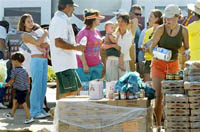Russia will not open oil-for-food investigations
Russia indicated Friday that it would not open investigations against companies or individuals accused of illicitly benefiting from the United Nations' oil-for-food program in Iraq . "In the documents given to the Russian side by the Volcker Commission, there is no base of evidence, and they (the documents) could not be the basis for starting an investigation," Foreign Ministry spokesman Mikhail Kamynin said in a statement. "Moreover, individual materials give doubts as to their authenticity."

Moscow appears to have toughened its stance since November, when its ambassador to the U.N., Andrey Denisov, told a news conference that the allegations would be investigated "in one way or another." Even then, though, Russian officials had rejected the report as "one-sided."
Oil-for-food was originally designed to provide health care for millions of Iraqis trying to cope with tough U.N. sanctions imposed after Iraqi dictator Saddam Hussein's 1990 invasion of Kuwait . It allowed Iraq to sell limited and later unlimited quantities of oil, provided most of the money went to buy humanitarian goods to help ordinary Iraqis cope with U.N. sanctions. Iraqi dictator Saddam's government chose all the oil buyers and goods suppliers.
Countries that opposed U.N. sanctions imposed on Iraq after its 1990 invasion of Kuwait , such as Russia , were given priority, according to a report completed last year by the Independent Inquiry Committee, led by former U.S. Federal Reserve chairman Paul Volcker.
The October 2005 report alleged that Russian companies had received almost one-third of oil sales under the oil-for-food program, worth some US$19 billion ( 16 billion), and that they had paid US$52 million (43 million) in illicit surcharges to Saddam's government in 2001-2002. Russian officials latched onto findings that one of the documents uncovered, which bore the signature of one-time Kremlin chief of staff Alexander Voloshin, appeared to have been fabricated. The investigators concluded that there was not sufficient evidence to incriminate him.
But the report named many others. In addition to Russian oil companies such as Lukoil and government departments such as the Emergency Situations Ministry, the report fingered the Russian Communist Party, nationalist politician Vladimir Zhirinovsky and Russia 's ambassador to Iraq and his son as beneficiaries of the corrupt program.
Also Friday, the Iraqi ambassador to Russia , Abdul Karim Hashim Mostafa, said his country intends to demand compensation. "Of course, we will seek compensation for the damage inflicted in the course of the program, but there are no mechanisms yet through which the compensation can be paid," Mostafa was quoted as saying by the RIA Novosti news agency. Mostafa did not specify from whom Iraq would seek compensation and did not provide any other details, reports the AP.
N.U.
Subscribe to Pravda.Ru Telegram channel, Facebook, RSS!


